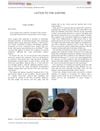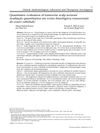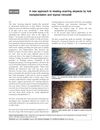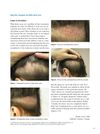13 citations,
January 1993 in “Archives of dermatological research” Human hair follicles can grow and stay healthy for up to 8 days in a lab setting.
13 citations,
November 1985 in “International Journal of Dermatology” The study found clear differences in lesion distribution and microscopic features among trichostasis spinulosa, keratosis pilaris, and eruptive vellus hair cysts.
13 citations,
January 1985 in “International Journal of Dermatology” The document found differences in lesion distribution and microscopic features among trichostasis spinulosa and similar skin conditions.
 12 citations,
September 2020 in “Journal of cosmetic dermatology”
12 citations,
September 2020 in “Journal of cosmetic dermatology” Trichoscopy is useful for diagnosing and monitoring alopecia areata treatment.
 12 citations,
September 2018 in “International Journal of Cosmetic Science”
12 citations,
September 2018 in “International Journal of Cosmetic Science” Palmitoyl tetrapeptide-20 may help reduce hair greying and increase melanin production.
 12 citations,
June 2018 in “Journal of Cosmetic Dermatology”
12 citations,
June 2018 in “Journal of Cosmetic Dermatology” PRP is effective for hair loss and might work better with other treatments, but more research is needed.
 12 citations,
March 2018 in “Australasian Journal of Dermatology”
12 citations,
March 2018 in “Australasian Journal of Dermatology” Minoxidil treatment can reduce hair shedding, increase hair volume, and even change hair color in patients with loose anagen hair syndrome.
 12 citations,
November 2014 in “PLOS Computational Biology”
12 citations,
November 2014 in “PLOS Computational Biology” The study concluded that hair growth in mice is regulated by a stable interaction between skin cell types, and disrupting this can cause hair loss.
 12 citations,
January 2014 in “Menoufia Medical Journal”
12 citations,
January 2014 in “Menoufia Medical Journal” Dermoscopy improves diagnosis of hair and scalp disorders and can help avoid unnecessary biopsies.
 12 citations,
June 2012 in “Dermatologic Surgery”
12 citations,
June 2012 in “Dermatologic Surgery” Hair transplantation effectively treated a woman's patchy hair loss when other treatments failed.
 12 citations,
January 2010 in “Hair transplant forum international”
12 citations,
January 2010 in “Hair transplant forum international” The survival rates of hair grafts are similar regardless of how they are trimmed.
 12 citations,
June 2006 in “Anais Brasileiros de Dermatologia”
12 citations,
June 2006 in “Anais Brasileiros de Dermatologia” The study found average numbers for different types of hair follicles in the scalp and observed differences between men and women, suggesting reasons for more common hair shedding in women.
 12 citations,
January 2006 in “Aesthetic Plastic Surgery”
12 citations,
January 2006 in “Aesthetic Plastic Surgery” Micrografts can effectively restore pubic hair, and using the right technique is crucial for natural-looking results.
12 citations,
January 2004 in “International Journal of aromatherapy/International journal of aromatherapy” Ocimum oil may promote hair growth and reduce hair loss from cyclophosphamide.
 12 citations,
October 1996 in “Dermatologic Clinics”
12 citations,
October 1996 in “Dermatologic Clinics” A simplified method was introduced to diagnose most hair loss types by examining the patient's history and scalp, with some cases needing further tests.
11 citations,
May 2022 in “JEADV. Journal of the European Academy of Dermatology and Venereology/Journal of the European Academy of Dermatology and Venereology” Most cutaneous adnexal tumors examined were benign and resembled common skin tumors.
 11 citations,
February 2021 in “Biomedicines”
11 citations,
February 2021 in “Biomedicines” Bacteria in our hair can affect its health and growth, and studying these bacteria could help us understand hair diseases better.
11 citations,
January 2018 in “Springer eBooks” The book helps surgeons improve hair transplants for Asian patients.
 11 citations,
July 2017 in “Expert Opinion on Investigational Drugs”
11 citations,
July 2017 in “Expert Opinion on Investigational Drugs” New hair loss treatments may include topical medications, injections, and improved transplant methods.
 11 citations,
October 2015 in “Journal der Deutschen Dermatologischen Gesellschaft”
11 citations,
October 2015 in “Journal der Deutschen Dermatologischen Gesellschaft” Women who had bariatric surgery risk nutritional deficiencies causing skin issues during pregnancy and breastfeeding.
 11 citations,
April 2015 in “EBioMedicine”
11 citations,
April 2015 in “EBioMedicine” JAK inhibitors may help treat Alopecia Areata but need careful monitoring due to side effects.
11 citations,
January 2015 in “JOURNAL OF HEALTH SCIENCE” A 12-year-old boy's rare skin condition improved with topical treatments and may resolve by puberty.
 11 citations,
September 2013 in “Journal of The European Academy of Dermatology and Venereology”
11 citations,
September 2013 in “Journal of The European Academy of Dermatology and Venereology” People with alopecia areata may be more likely to have a certain type of hearing loss.
 11 citations,
January 2013 in “Indian Dermatology Online Journal”
11 citations,
January 2013 in “Indian Dermatology Online Journal” CCCA is a common, progressive hair loss condition that may not always be linked to hair care practices and requires a biopsy for diagnosis.
 11 citations,
January 2012 in “International Journal of Trichology”
11 citations,
January 2012 in “International Journal of Trichology” Caffeine may help hair growth in hereditary hair loss.
 11 citations,
August 2010 in “Journal of Dermatology”
11 citations,
August 2010 in “Journal of Dermatology” Hair transplantation can effectively treat stable eyebrow hair loss in alopecia areata patients.
 11 citations,
January 2010 in “Indian Journal of Dermatology, Venereology and Leprology”
11 citations,
January 2010 in “Indian Journal of Dermatology, Venereology and Leprology” Hair transplant and applying 5% minoxidil solution can effectively treat permanent hair loss, but it may change hair direction in some cases.
11 citations,
January 2009 in “Indian journal of dermatology, venereology, and leprology” DCPA is a chronic skin condition affecting the lower limbs, mainly in men, with unclear causes and treatments that often don't work well.
 11 citations,
July 2008 in “Facial Plastic Surgery Clinics of North America”
11 citations,
July 2008 in “Facial Plastic Surgery Clinics of North America” Hair restoration surgery redistributes existing hair to achieve a natural look, with visible regrowth in 3-4 months and rare complications, mostly aesthetic.
 11 citations,
June 2008 in “Dermatologic Surgery”
11 citations,
June 2008 in “Dermatologic Surgery” Transplanting chest hair into scalp scars may effectively treat wide donor scars in hair restoration.





















